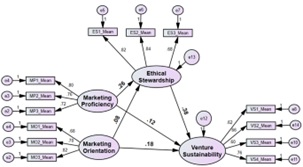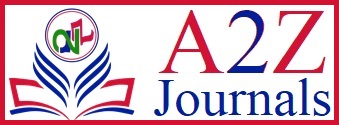Random Effect Model for Ethical Stewardship Mediation among Ethiopia's SMEs based on Marketing Proficiency and Orientation

DOI:
https://doi.org/10.54060/jmss.v3i1.36Keywords:
Marketing proficiency, Marketing Orientation, Ethical Stewardship, Sustainability of ventureAbstract
As the world economy continues to move towards deeper integration, MSE will benefit most from its involvement in the global economy. With ethical stewardship acting as a mediating factor, this study will investigate the effect of marketing talent and direction on venture success: the state of a select group of Ethiopian SME sectors. Using surveys and questionnaires to gather data, the study used a quantitative research design method. SME owners and leaders of the job opportunity creation and proficiency offices in both zones and towns are purposefully chosen to participate in this study through random sampling and purposeful sampling, and they are asked to complete questionnaires. Given the extent of the Zone, the researcher will pick five towns to study: Nagele, Adola, Shakiso, Bore, and Haro Wachu. The sample size was determined to be 382 responders in total. Due to Yamane's (1967) simplicity of use, the sample size will be determined by taking into account the anticipated total population of 2,322 business owners, job creators, and competent office executives in 5 towns. For the data analysis in the meta analysis, the random effect model was employe. The impact of marketing talent and direction on venture success was examined in this case using mata analysis, which also used forest plot, funnel plot, moderation analysis, publishing bias based on effect size, and ethical stewardship as a mediating factor. The results indicated that every factor had a positive and notable impact on a company's ability to sustain itself.
Downloads
References
S. Schlepphorst, E. C. Koetter, A. Werner, C. Soost, and P. Moog, “International assignments of employees and entrepreneurial intentions: the mediating role of human capital, social capital and career prospects,” Int. J. Entrep. Behav. Res., vol. 26, no. 6, pp. 1259–1279, 2020.
C. H. Lim and K. B. Teoh, “Factors influencing the SME business success in Malaysia,” Annals of Human Resource Management Research, vol. 1, no. 1, pp. 41–54, 2021.
L. O. Khan & R. Aslam, “Marketing innovation Proficiency is Among Young Learner Through Play Strategy: A Qualitative Study,” Humanit. Soc. Sci. Rev., vol. 9, no. 2, pp. 64–74, 2021.
D. Putra and G. Adnyani, “Entrepreneurship Self-Efficacy and Entrepreneurial Motivation on the Entrepreneurial Intentions of Management Majors Student,” American Journal of Humanities and Social Sciences Research (AJHSSR), vol. 5, no. 5, pp. 518–523, 2021.
M. A. L. Zubi and M. B. Khalid, “The effect of strategic leadership on intellectual capital: The mediating role of the knowledge sharing in Kuwait industrial companies,” Manag. Sci. Lett., vol. 12, no. 4, pp. 291–306, 2022.
H. Diabate, L. Sibiri, L. Wang, et al., “Assessing SMEs’ sustainable growth through marketing innovators’ ability and marketing orientation: An insight into SMEs in Côte d’Ivoire,” Sustain., vol.11, no.24, 2019.
W. Astuti, F. Supanto & B. Supriadi, “Marketing Proficiency s and SME’s Sustainability of venture: Empirical Study Culinary Ven-ture,” J. Econ. Sustain. Dev., vol.10, no.22, pp.160–166, 2019.
A. F. Ahmad and G. Karadas, “Managers’ perceptions regarding the effect of leadership on organizational performance: Medi-ating role of Green supply chain management practices,” SAGE Open, vol. 11, no. 2, p. 215824402110186, 2021.
Rahayu and S. Laela, “The Influence of Marketing Interest and Use of Social Media on Student Marketing innovation,” Journal Pengemb Wiraswasta, vol. 20, no.3, 2018.
A. l. Idrus, A. Abdussakir, S. Al Idrus, et al., “The Contribution of Managerial Ability and Marketing Orientation on Sustainablity of venture with Venture Climate as Mediation Variable,” Iqtishoduna, vol.18, no.1, pp.1–16, 2022.
S. A. Mazhar, R. Anjum, A. A. Khan, et al., “Methods of Data Collection: A Fundamental Tool of Research,” J. Integr. Community Heal., vol.10, no.1, pp.6–10, 2021.
M. Adula, S. Kant, “Examining Marketing innovation Vital Factors affecting the Sustainability of MSE’s in Ethiopia, Horn of Afri-ca.,” International Journal of Law Policy and Governance, vol.1, no.1, pp.24-32, 2022.
M. Adula and S. Kant, “Examining Marketing innovation Vital Factors affecting the Sustainablity of MSE’s in Ethiopia, Horn of Africa,” International Journal of Law Policy and Governance, vol. 1, no. 1, pp. 24–32, 2022.
G. G. Wakjira & S. Kant, “Significance of Market Orientation on Sustainablity of venture With Mediating Role of Employee and Customer Satisfaction in Ethiopia Banks,” Partners Universal International Research Journal, vol.1, no.4, pp.118-125, 2022.
G. G. Wakjira & S. Kant, “ASSESSMENT OF CHALLENGES AND PROSPECTS OF LOCAL MILK SUPPLY ON MARKET SUSTAINABLITY: A CASE OF ETHIOPIA,” HORN OF AFRICA. JURNAL PETERNAKAN SABANA, vol.1, no.2, pp.102-109, 2022.
S. Kant & G. Tufa, “Reviewing Relevance of Stewardship Styles on Stewardship Outcomes: An Epistemological Study of Bule Hora Town, Oromia Regional State Ethiopia,” IJCRT, vol.8, no.10, pp.1899-1908, 2022.
S. Kant & K. Asefa, “TRANSFORMATIONAL EDUCATIONAL STEWARDSHIP EFFECT ON STAFF MEMBERS ENGAGEMENT: THE MEDIATING IMPACT OF INTRINSIC ORIENTATION, “International Journal of Venture and Management (IJBM), vol.1, no.2, pp.35-49, 2022.
M. Adula, S. Kant, Z. A. Birbirsa, “Systematic Literature Review on Human Resource Management Effect on Organization Sus-tainablity,” Annals of Human Resource Management Research, vol.2, no.2, pp.131-146, 2022.
S. Kant, B. Belay & A. Dabaso, “Coffee Logistics Operation Knowledge Effect on Cooperative Associations Functionalism in Ethiopia with Mediation of Cybernetics and Local People Knowledge Base,” Journal of Production Operations Management and Economics (JPOME), vol.3, no.1, pp.21-33, 2023.
K. Asefa & S. Kant, “Transactional Academic Stewardship Effect on Employee’s Engagement: The Mediating Impact of Extrinsic Orientation,” Partners Universal International Research Journal, vol.1, no.4), pp.54-62, 2022.
G. G. Wakjira, "Influencing Factors of Micro Finance Institute on Innovative Marketing innovation Growth: In Case of West Guji Zone bule Hora Woreda.," Partners Universal International Innovation Journal, vol.1, no.1, pp. 60-74, 2023.
M. Jufri and H. Wirawan, “Internalizing the spirit of entrepreneurship in early childhood education through traditional games,” Educ. Train., vol. 60, no. 7/8, pp. 767–780, 2018.
S. Shane, W. Drover, D. Clingingsmith, and M. Cerf, “Founder passion, neural engagement and informal investor interest in startup pitches: An fMRI study,” J. Bus. Venturing, vol. 35, no. 4, p. 105949, 2020.
V. Barba-Sánchez and C. Atienza-Sahuquillo, “Entrepreneurial intention among engineering students: The role of entrepre-neurship education,” Eur. Res. Manag. Bus. Econ., vol. 24, no. 1, pp. 53–61, 2018.
C. Lang and C. Liu, “The entrepreneurial motivations, cognitive factors, and barriers to become a fashion entrepreneur: A di-rection to curriculum development for fashion entrepreneurship education,” Int. J. Fash. Des. Technol. Educ., vol. 12, no. 2, pp. 235–246, 2019.
R. Badr El-Deen and E.-H. Ali, “The impact of strategic leadership styles on financial business performance and sustainable competitive advantage in travel agencies and hotels: Corporate social responsibility as a mediator,” Journal of Association of Arab Universities for Tourism and Hospitality, vol. 21, no. 1, pp. 70–90, 2021.
S. Finkelstein and D. C. Hambrick, Strategic leadership: Top executives and their effects on organizations: Citeseer. Citeseer, 1996.
M. A. Hitt, R. D. Ireland, and R. E. Hoskisson, Strategic management: Concepts and cases: Competitiveness and globalization: Cengage Learning. 2016.

Downloads
Published
How to Cite
CITATION COUNT
Issue
Section
License
Copyright (c) 2023 Dereje Dinsa Negeri, Gada Gizachew Wakjira, Shashi Kant

This work is licensed under a Creative Commons Attribution 4.0 International License.























